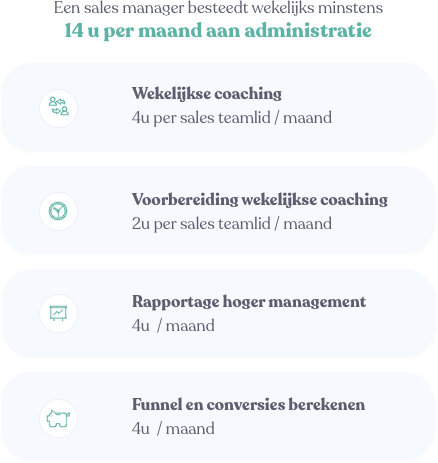How long should a deal stay in your sales pipeline?
Many sales managers leave deals in their sales pipeline for too long. But that gives you a skewed picture of expected sales. That's why they need to get them out in time. The consequences of not doing this, and some golden rules for your sales pipeline, are explained in this blog.
The consequences of a deal staying too long in your pipeline
For those in doubt: yes, deals that do not have a won/lost decision within a reasonable amount of time should be removed from your pipeline irrevocably. There are several reasons for this:
- "Expired" deals give a skewed view of expected sales: Expected sales give you a forecast of what can potentially be won by sales in the future. If there are "expired" deals in your pipeline then you have a skewed view of expected revenue and you're going to steer your sales team based on incorrect numbers. Not good!
- You manage reactively: You don't see sales problems coming, or you see them far too late. As a result, you will steer your sales team reactively rather than proactively.
-
Greater chance of missing sales targets: A direct consequence of reactive steering: as a manager, you can only intervene when it's already too late and so your team has a greater chance of missing targets.
What about deals you take out of your pipeline?
Taking a deal out of the pipeline doesn't mean that you will never follow up on it. You can simply plan a follow-up action in your calendar, and take the deal out of your pipeline at the same time. That way you keep the contact warm, without polluting your expected sales with misinformation. If the situation changes and your prospect still wants to get to know you further or wants to do business with you right away, you simply create a new deal.
There are 2 golden rules for your sales pipeline:
- Your sales pipeline should only contain deals that you are actively working on. All long-term follow-ups, are tasks in your calendar. Also, for example, a tender without a due date should not be in your pipeline, because you are not actively working on it.
- Do you have an "on hold" phase in your pipeline? Get rid of it! This phase gives a misleading picture of the true reality of your expected sales.
How long can a deal sit in your pipeline?
What is too long and when does a deal have to go? You determine that together with your team. For each phase in the pipeline you agree on how long a deal can remain in it. For us, that's one month on average for each phase.
What do you do, for example, with a demo that you schedule three months after an introduction? Then you should actually schedule a new introductory meeting and find out what has changed. Then you remove the deal from the sales pipeline and make a follow-up action in your calendar. If the demo actually goes through, you create a new deal in your CRM. Then all that remains is to convince your prospect! Having trouble doing that? Here are some tips.





